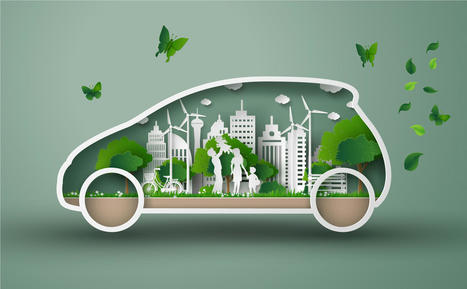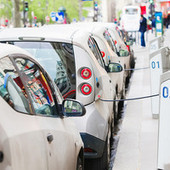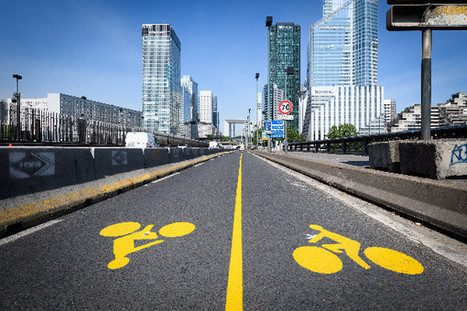 Your new post is loading...

|
Scooped by
Energy Cities
May 14, 10:37 AM
|
In the northern neighbourhood of De Banne in Amsterdam, a small electric vehicle quietly makes its rounds. Known as the Banne Hopper, this compact shuttle navigates bike paths and pavements, offering rides to locals heading to the hairdresser, the supermarket, the doctor, or even a local card game. Unlike a flashy start-up, this is a grassroots mobility initiative — entirely set up and run by the neighbourhood itself.

|
Scooped by
Energy Cities
March 15, 2023 6:47 AM
|
The City of Bilbao is initiating a new project, which will expand the electrification of the public transit network in the city by allowing electricity to be transferred from the local metro to the lo..

|
Scooped by
Energy Cities
April 21, 2022 10:26 AM
|
In numerous studies, electric automobiles have been found to be beneficial for the environment, as they release fewer greenhouse gases and pollutants into the air. Electric vehicles have the potential to minimise transportation-related pollution while also mitigating global warming. Europe has managed to position itself as one of the global leaders against climate change. Over the last few years, the European Union has taken significant measures toward climate mitigation. However, if the world wants to avoid the worst effects of climate change, countries only have a limited amount of time to act. That is why it is crucial for national, regional, and local authorities to stay up-to-date when it comes to looking for new solutions that can help in the fight against climate change.

|
Scooped by
Energy Cities
December 6, 2021 10:37 AM
|
The German city of Münster has once again confirmed its dedication to sustainable transit and climate action. Mayor of Münster Markus Lewe attended the opening ceremony of the e-bus line 8 which now consists almost entirely of electric buses. Mayor Lewe stated on social media: “Electric buses are a win-win for everyone involved, so every …

|
Scooped by
Energy Cities
November 3, 2021 3:13 AM
|
The Trollino 24 MetroStyle, a new public transport vehicle with two bellows will be tested on Tallinn trolleybus lines. It can run as a trolley, but can also disconnect from the wires and run on battery power, the same way as an electric bus. It can capacitate approximately two hundred passengers, which is four times …

|
Scooped by
Energy Cities
March 4, 2021 11:45 AM
|
The public transport sector has been hit hard by the covid-19 crisis. Since climate change is not taking a break, electrification must be at the centre of a green recovery. Smart depots will play a crucial role in transforming the face of urban transport, says Monique Mertins at Siemens Smart Infrastructure

|
Scooped by
Energy Cities
February 1, 2021 11:12 AM
|
The Velorent pilot project has been launched in the Estonian city of Tartu. The project is part of the CyclUrban+ project, which is supported by the European Climate Change Programme, and will run until the end of summer 2021. The pilot project aims to test the interest of individuals, businesses, and potential providers in the use of cargo bikes. The aim of the Tartu City Government is that the private sector will express an interest in providing cargo bikes as a service, as a result of the pilot.

|
Scooped by
Energy Cities
November 30, 2020 2:34 AM
|
Utrecht residents will be able to use an electric shared cargo bike from next spring. The municipality is starting a partnership with the Cargoroo company for a two-year trial with 100 e-cargo bikes. From the spring, Cargoroo will place the e-shared cargo bikes throughout the city, depending on the enthusiasm in the various neighborhoods. The trial is linked …

|
Scooped by
Energy Cities
October 22, 2020 4:08 AM
|
Deputy Mayor of Ghent Filip Watteeuw hopes that the city will accelerate the transition towards electric vehicles by adding an extra 100 charging points at the car parks. “The number of charging points is constantly increasing,” says Deputy Mayor for Mobility, Public Space and Urban Planning, Filip Watteeuw. “With this new program, an extra 100 …

|
Scooped by
Energy Cities
September 21, 2020 6:02 AM
|
With a total of 133 electric vehicles, the transit system in the Romanian city will be able to be 100% electric

|
Scooped by
Energy Cities
July 16, 2020 10:56 AM
|
Un quart de la flotte urbaine. Le 25 juin 2020, les six plus grandes villes du Danemark se sont engagées à n’acheter que des bus urbains à batterie électrique et à hydrogène à partir de 2021. Cette décision a été entérinée par un accord de coopération climatique entre les villes de Copenhague, Aarhus, Odense, Aalborg, Vejle et Frederiksberg avec le ministère danois des Transports. Ces six villes détiennent environ un quart du parc urbain du pays, soit 800 bus sur un total de 3.330. «Il est donc tout à fait naturel qu’elles soient le moteur de la transformation des transports publics», commente le ministre danois des Transports, Benny Engelbrecht. Ce dernier espère que cette initiative sera suivie par d’autres localités dans le pays.

|
Scooped by
Energy Cities
February 17, 2020 10:19 AM
|
Some 300 million euros of additional funding for the purchase of new electric buses in Germany have been cleared by the European Commission, bringing the total to 650 million euros.
The state aid scheme will apply until the end of next year and will allow Germany to replace large swathes of the country’s diesel bus fleet with more modern and environmentally-friendly vehicles.
The financing will be used for the purchase not only of electric and hybrid vehicles, however, but also for the creation of charging infrastructure throughout the country.

|
Scooped by
Energy Cities
February 12, 2020 5:44 AM
|
Anfang Januar 2020 startete das internationale Projekt SOLUTIONSplus, welches die Transformation zu einer nachhaltigen Mobilität im internationalen Kontext unterstützen soll. Im Rahmen des von der Europäischen Union (EU) geförderten Projekts arbeiten 45 Partner sowie über 100 assoziierte Partner gemeinsam an diesem transformativen Wandel mithilfe von innovativen und integrierten Elektromobilitätslösungen.
|

|
Scooped by
Energy Cities
February 20, 11:14 AM
|
While science fiction’s predictions of flying vehicles may not have materialised yet, innovations in the field of transport have changed how we get from A to B.
The range of mobility modes on offer in our cities today would seem futuristic to people from a few decades ago, such as driverless metro trains, semi-autonomous vehicles and app-activated electric scooters.
In addition to cutting journey times, innovation can help to reduce emissions by offering cleaner ways to transport goods and people.

|
Scooped by
Energy Cities
July 26, 2022 2:42 AM
|
Authorities in Hamburg announced that they will phase out internal combustion engine-powered boats on the Alster river. The move is part of the city’s climate plan and promises significant carbon redu..

|
Scooped by
Energy Cities
January 18, 2022 10:52 AM
|
A new study shows that rented e-scooters and e-bikes replace walking and public transit trips, increasing the climate impact of getting around the city

|
Scooped by
Energy Cities
November 29, 2021 2:55 AM
|
Transport is responsible for 24% of energy-related carbon emissions worldwide. Half of those emissions are from carrying goods and services, and the other half are from carrying people from A to B – also known as “passenger transport”.
Passenger transport has a huge impact on our surroundings, and it’s one of the biggest factors in determining where we live and work.

|
Scooped by
Energy Cities
May 12, 2021 3:48 AM
|
Les réductions des émissions de gaz à effet de serre et des particules résultant du remplacement de tous les moteurs thermiques par des alternatives sobres en carbone ne seront pas assez rapides pour faire la différence dans les quelques années qui nous restent.
Pour s’attaquer aux crises du climat et de la pollution atmosphérique, il faut réduire au plus vite tous les transports motorisés, voitures particulières en tête.
Or, en se concentrant uniquement sur les véhicules électriques, on ralentit la course vers une baisse drastique des émissions.

|
Scooped by
Energy Cities
February 25, 2021 10:48 AM
|
Changing the fuel won’t solve the bigger problems of our addiction to cars: their resource-intensiveness; their destruction of community; the sacrifice of our real future for manufacturer’s promises that there’ll be a better tomorrow if we just let them get away with a worse today; the highway carnage…. Farhad Manjoo discusses in an opinion piece on the New York Times website.

|
Scooped by
Energy Cities
January 13, 2021 6:29 AM
|
Positive “tipping points” in the uptake of electric vehicles and the decarbonisation of electricity generation could spark a global transition to a climate neutral economy, scientists say, providing fresh hope in the fight against global warming.

|
Scooped by
Energy Cities
October 22, 2020 10:39 AM
|
Charging infrastructure is one of the key ingredients necessary to further increase the market uptake of plug-in electric vehicles (PEVs). Most public charging infrastructure in Europe is not profitable, and 42% of European households reside in dwellings with no possibility to install a private charger, which are key limitations to the build-up of charging infrastructure. This work presents and analyzes an alternative business model for ‘community-owned charging points’ that combines many of the convenience advantages of private charging with the cost savings of a joint purchase. Survey data from 3,131 households in Austria is used to identify barriers to PEV charging and charging infrastructure usage, and investigate consumers’ preferences with respect to community-owned charging points. Four key target groups of customers for such a business model are identified based on their socio-economic characteristics, purchase history, and expressed level of environmental concerns, including current PEV owners, high income households, photovoltaic (PV) owners, and environmentalists. Identified distinct preferences for the configuration of a collective charging station amongst these groups include lower importance attached to flexibility to charge the vehicles at any time by current PEV owners, higher sensitivity to cost per charge of PV owners, and strong preferences for comfort and flexibility demonstrated by high income households.

|
Scooped by
Energy Cities
October 12, 2020 11:58 AM
|
Two bus storages with solar panels installed on their roof structure were handed over in the Kelenföld Division of the Budapest Transport Privately Held Corporation (BKV) last Friday. While far from being a sensation, the event proved yet another step in the implementation of BKV's climate and energy strategy towards achieving a greener, more liveable Budapest.
Green island with a twofold purpose
The location of the project is not only practical, but also symbolic, as Kelenföld is home to BKV’s zero-emission, purely electric buses. With the latest energy-conscious investment of Budapest’s main public transport operator, the company’s bus garage in Kelenföld has become a “green island” that not only provides electric buses to the travelling public, but also generates some of their electricity needs from renewable energy sources by replacing fossil fuels.

|
Scooped by
Energy Cities
September 16, 2020 5:48 AM
|
A new micromobility service dedicated to free-floating shared e-scooters arrived in Parma at the beginning of this month. The service is managed by three different companies which have been awarded the tender published by Infomobility, on behalf of the Municipality of Parma. E-scooters, which are gaining ground in many other Italian cities, are considered as an opportunity to move around the city while protecting the environment and the air we are breathing.

|
Scooped by
Energy Cities
June 23, 2020 2:30 AM
|
Distinctive new number plates could help drivers access cheaper parking and emissions charge exemptions

|
Scooped by
Energy Cities
February 12, 2020 5:50 AM
|
An EU-funded research project has just published a report about how to develop public transport outside of cities in order to improve accessibility and to reduce exclusion. The project, INCLUSION, is a Horizon 2020 project that aims to address some of the issues relating to the accessibility and inclusiveness of public transport in remote urban, rural and deprived areas. It is focusing on identifying gaps and unmet requirements for all, and especially for vulnerable users, to create and test inventive and transferrable solutions.
|
 Your new post is loading...
Your new post is loading...































